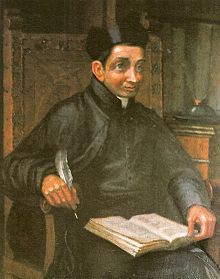Elegías de varones ilustres de Indias
In this article, we will explore the fascinating life of Elegías de varones ilustres de Indias and his impact on today's society. From humble beginnings to his rise to the top, Elegías de varones ilustres de Indias has left an indelible mark on history. Through his achievements and challenges, Elegías de varones ilustres de Indias has inspired countless people to follow in his footsteps and achieve their own goals. Throughout these pages, we will discover the secrets behind Elegías de varones ilustres de Indias's success and how his legacy continues to influence future generations. Get ready to embark on an exciting journey through the life of Elegías de varones ilustres de Indias!
 Juan de Castellanos | |
| Author | Juan de Castellanos |
|---|---|
| Country | Colombia |
| Language | Spanish |
| Subject | Spanish conquest of Colombia Spanish conquest of Venezuela indigenous groups in Colombia indigenous groups in Venezuela |
| Genre | Poem |
| Set in | Colombia, Venezuela |
Publication date | Late 16th century |
| Pages | 567 |
| Website | Elegías de varones ilustres de Indias (Google Books) |
Elegías de varones ilustres de Indias is an epic poem written in the late sixteenth century by Juan de Castellanos.
Description
The work gives a detailed account of the colonization of the Caribbean and the territories in present-day Colombia and Venezuela. It describes the settlement companies and foundation of cities as well as vivid depictions of indigenous cultures, such as the Muisca, and natural history, making this text an important early chronicle of the Spanish colonization of the Americas. Besides its historical value, it is notable for the use of multiple Renaissance-era literary styles, including the elegy, epic, pilgrimage tale, pastoral romance, chivalric romance and other literary forms.
The book contains one of the earliest descriptions of the New World species potato (Solanum colombianum), an unknown plant in the Old World before the discovery of the Americas by Europeans.
See also
References
- ^ Becco, Horacio Jorge. 1991. Crónicas de la Naturaleza del Nuevo Mundo, 148. Cuadernos Lagoven, Lagoven, S.A. Caracas.
- ^ Hernández Caballero, Serafín. 1998. Gran Enciclopedia de Venezuela. Editorial Globe, C.A. Caracas.
- ^ Rodriguez, Francisco Javier. s.a.. Interpretación del 'Las Elegías' de Juan de Castellanos. Accessed 2016-08-26.
